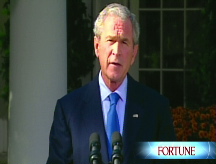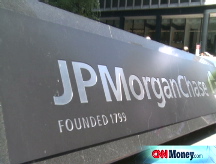World takes action to fix crisis
European nations outline lending guarantees as world leaders scramble for solutions.
NEW YORK (CNNMoney.com) -- European countries acted quickly Monday to shore up troubled banks by promising billions of euros in loan guarantees and capital investment.
The announcements - from France, Germany, Spain and Britain - followed an emergency meeting in Paris Sunday by the leaders of 15 European nations.
French President Nicholas Sarkozy, who also currently holds the rotating presidency of the European Union, pledged to pour $480 billion (360 billion euros) into the French banking system.
"The taxpayer will be the winner," he told the French people in a nationally televised address Monday.
The story was similar in Berlin, where Chancellor Angela Merkel pledged $653 billion (480 billion euros) to support the German banking system and the British government separately said it would pour $63 billion (37 billion pounds) into thre major banks. In Spain, Prime Minister Jose Luis Rodriguez Zapatero said the government would set aside $134 billion (100 billion euros) to guarantee inter-bank loans.
The 15-nation group had said on Sunday that they would protect individual depositors' accounts and move to ease accounting regulations that determine how assets are valued, removing a requirement that they be based on market prices - so-called "mark-to-market" accounting.
The world's leading nations were scrambling over the weekend to come up with coordinated solutions aimed at stemming the fallout from the worst global financial crisis in decades.
Stock markets had plummeted as anxiety over the credit crisis - which began in the implosion of U.S. housing prices - spread worldwide. Both overseas and domestic markets responded positively Monday to the fresh news from around the world that governments and central banks are moving quickly.
Four central banks, including the Federal Reserve, announced an unlimited dollar currency swap before U.S. markets opened. The deal, which only applies to short-term lending (one-week, 28-day and 84-day), involves the Bank of England, the European Central Bank and the Swiss National Bank. The new plan will continue through April 30, and the Bank of Japan will consider introducing similar measures.
Early Monday, U.S. Treasury official Neel Kashkari outlined the government's multi-prong effort to bail out the United States financial system, though he offered few details on how the plan will be carried out.
Coming up later on Monday, Treasury Secretary Henry Paulson has called a meeting of the top U.S. banking heads for Monday at 3 p.m. ET, according to The Wall Street Jounrnal's online edition.
"In recent weeks, financial market turmoil intensified throughout the world and credit markets froze, causing a chain reaction resulting in non-financial companies experiencing difficulty in financing normal business operations." Paulson told the IMF on Sunday.
The Bush administration is considering whether to use the authority granted in the $700 billion rescue plan enacted on Oct. 3 to take ownership stakes in financial institutions to stabilize and restore confidence in them.
Other countries also took fresh action Sunday to support their economies. Australia, New Zealand, the United Arab Emirates and Saudi Arabia have all reportedly moved to guarantee bank deposits.
Over the weekend, President Bush and finance officials from the Group of Seven, Group of 20 and the International Monetary Fund vowed vigilance in helping economies around the world on the road to recovery.
Concerns about the solvency of banks and financial institutions in recent weeks "had pushed the global financial system to the brink of systemic meltdown," said Dominique Strauss-Kahn, IMF managing director.
Strauss-Kahn said steps taken so far by the United States and European nations hadn't been fully effective and that more would be necessary in "the coming months."
For his part, President Bush on Saturday did not announce any new actions, but reiterated measures world leaders are taking to strengthen financial systems.
Both Bush and Treasury Secretary Paulson spoke about the latest step being contemplated by the United States - injecting much-needed capital into banks.
Strauss-Kahn of the IMF said Sunday that the recapitalization of banks is "absolutely needed."
The current crisis, he said, "started as a liquidity question. But the liquidity problems became too big. To solve a solvency problem you need to act directly."
The G-7 pledged Friday night to take steps to keep leading institutions afloat, unfreeze credit, ensure banks have enough capital to kick start lending and safeguard depositors' funds and restart the secondary markets for mortgages and other securitized assets.
In another sign of the world effort, officials of the G-20 issued a statement late Saturday saying that the "global implications" of the crisis required international cooperation. The G-20 is made up of rich and emerging nations that produce 90% of the world's economic output.
The International Monetary Fund endorsed the G-7's commitment to do everything possible to jumpstart the world's economies.
The IMF's Monetary and Finance Committee said in a statement that it "recognizes that the depth and systemic nature of the crisis call for exceptional vigilance, coordination, and readiness to take bold action."
The meetings in Washington capped a week in which fear gripped financial markets worldwide. The Dow Jones industrial average had its worst week ever, falling just over 1,874 points, or 18%. Wall Street lost roughly $2.4 trillion in market value during the week, according to losses in the Dow Jones Wilshire 5000, the broadest measure of the market.Since the mid-September collapse of Lehman Brothers sparked the latest chaos in the financial markets, Bush has repeatedly tried to reassure the Americans.
The CNN Wire reports and the Associated Press were used in compiling this article. ![]()




